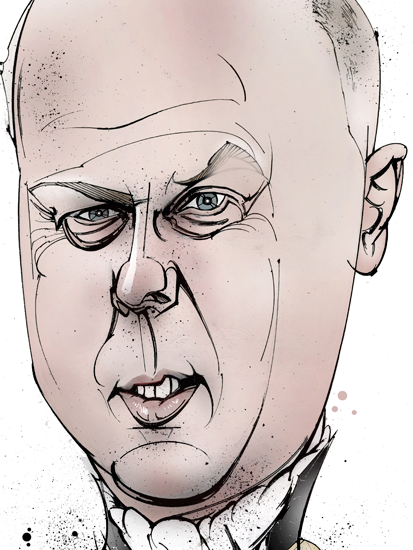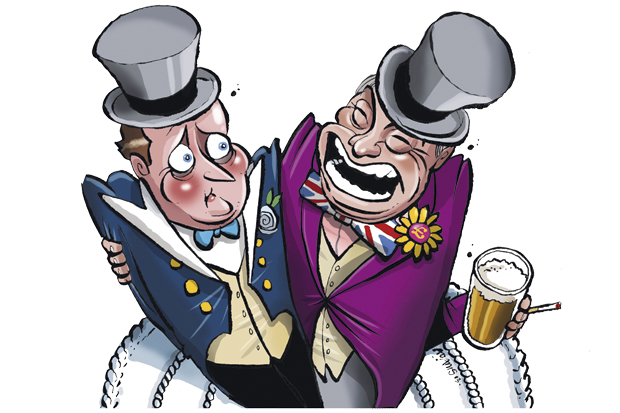When I meet Chris Grayling in his departmental office, I do a double take. The Justice Secretary is not wearing a suit or even his Lord Chancellor’s robes but a pair of pale chinos and a pink Ralph Lauren button-down shirt. Noticing my surprise, Grayling reveals that this is his definition of ‘smart casual’: he’s off to a Tory away day straight after the interview.
Grayling is 6ft 5 and his height makes his mood pretty obvious. Straight after the last election, his shoulders were hunched and his head was down. As he now admits, ‘I didn’t want us to go into coalition.’ Compounding his misery, he had missed out on a cabinet post despite having been shadow home secretary. But Grayling is now in cabinet and standing tall. He beams as he shows me the view from his room, which sweeps round from Buckingham Palace to Whitehall.
When Grayling replaced Ken Clarke as Justice Secretary, it signalled a hardening of the Tory position on a host of issues, most notably the European Convention on Human Rights and the European Court of Human Rights. Grayling declares that ‘the whole situation now is wholly and utterly unacceptable’. His view is that they were ‘never designed to do the kind of things they are doing today’. He complains that the European Court has ‘an almost unlimited jurisprudence to decide what it thinks are human rights matters and the envelope is being pushed wider and wider and wider’.
But condemning the current situation is the easy part; working out what to do about it the hard part. Grayling promises that he’ll set out his answer in ‘draft legislation which we will publish later in the year, next year’.
He won’t be drawn on the specifics of what will be in this bill. He wants to see what the working group he has set up with former Tory leader Michael Howard on it suggests. But he’s clear that: ‘We have to curtail the role of the European Court of Human Rights in the UK, get rid of and replace Labour’s Human Rights Act. We have to make sure that there is a proper balance between rights and responsibilities in law.’
Crucially, he adds, ‘I want to see our Supreme Court being supreme again. I think people want to see the Supreme Court of the United Kingdom being in the United Kingdom and not in Strasbourg.’ That last sentence is the heaviest hint yet that the Tories will back leaving the jurisdiction of the European Court of Human Rights. Without that, the Strasbourg court will always be supreme.
The plan, though, has little chance of getting past the Tories’ current coalition partners. Grayling is well aware of this. He pledges, ‘I am going to sweat every sinew to try and make sure we are not in coalition after the next election.’ He also plans to campaign against both Labour and the Liberal Democrats on the issue, booming that they ‘are fundamentally wrong and it is going to be a big battleground at the next election’.
Grayling regards sorting out Britain’s relationship with the Strasbourg court as being as important as renegotiating the terms of Britain’s membership of the EU: something that Cameron has declared he’ll do if he’s Prime Minister again, regardless of whether it’s a coalition or not. The Justice Secretary, though, keen as he is to preserve Tory unity, won’t say that it should be a red line in any future coalition negotiation.
On Europe, he’s taken a self-denying ordinance. Despite describing himself as a ‘staunch Eurosceptic’, he declines to say anything about what he would want out of the renegotiation because ‘it’s not my patch’. His very loyalist line is that what Eurosceptics should care about is a Tory majority that will deliver an EU referendum. He has little time for those tempted by Ukip, harrumphing that ‘a vote for Nigel Farage is a vote for Ed Miliband’.
When I push him on how he thinks the Tories should counter Farage, he replies, ‘The first rule for dealing with Ukip is to say not a lot more than we’re offering you an in/out referendum, we’re offering you reforms to the Human Rights Act and we’re offering you David Cameron as Prime Minister rather than Ed Miliband.’
Grayling is by instinct an attack-dog and he’s itching to get stuck into Miliband. Whenever the Labour leader comes up, he shifts his weight forward in his chair and starts chopping the air with his right hand. ‘Ed Miliband is the most left-wing Labour leader since Michael Foot. They are talking the language of 1970s class envy, the politics of envy, the wealth taxes and the rest. We’ve been there, we’ve done it. It was disastrous for us as a nation. It leaves us trailing the world economically.’ Almost leaning out of his chair, he warns that in this globalised world, the idea ‘you could impose a wealth-tax, welfare-state, trade-union-dominated, state-intervention regime and hope that to lead anywhere else except disaster for this country is for the birds’.
Much of Grayling’s pep comes from the fact that the economy seems to be recovering, at last. He dismisses the fact that ‘all psephologists say the Tory party can’t win because parties don’t improve their votes when they are in government’. He argues that the next election will turn on the fact that ‘the guys who wrecked the economy in the first place, who now realise they wrecked it in the first place, are now asking for their jobs back’.
The other big issue sitting in Grayling’s in-tray at the moment is whether Muslim women should be able to wear the niqab in court. He backs the view of the judge in the Lorgat case that defendants should not be allowed to wear it when pleading or giving evidence. But beyond that, he is very wary of any restrictions on its use. ‘We are a free society and I don’t think we can say to people you may not wear a niqab.’ He’s also emphatic that ‘if somebody in my private office wore a niqab to work for religious reasons, I would not object to that’.
All this talk of dress codes is a reminder to Grayling that he should be heading off to his ‘smart casual’ away day. As he gets ready to leave, I ask him whether this job has given him an appetite for more. He bats the question away with, ‘I don’t want to leave government but actually I don’t want to leave this job either.’ So, all he needs to do now is to free himself of the constraints imposed on him by his coalition partners and those interfering judges in Strasbourg.
Got something to add? Join the discussion and comment below.
Get 10 issues for just $10
Subscribe to The Spectator Australia today for the next 10 magazine issues, plus full online access, for just $10.
You might disagree with half of it, but you’ll enjoy reading all of it. Try your first month for free, then just $2 a week for the remainder of your first year.















Comments
Don't miss out
Join the conversation with other Spectator Australia readers. Subscribe to leave a comment.
SUBSCRIBEAlready a subscriber? Log in